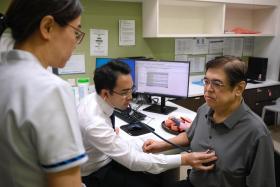Ageing well starts when one is young
It is key to reducing health risks in later years
Healthy ageing starts sooner than you would think. Indeed, you should start preparing for it from as early as 40 years old.
Dr Femke Hannes, regional lead for nutrition, science and advocacy at DSM Nutritional Products for the Asia-Pacific (Apac) region, told The New Paper: "Staying healthy in old age starts with being healthy at a younger age.
"Making healthy choices like having a balanced diet and active lifestyle when you are young reduces health risks in your later years."
According to a 2017 Nielsen study, one in four Singaporeans aged 40 and above has at least one chronic condition such as diabetes, high blood pressure and high blood cholesterol.
Dr Hannes, 35, is a Singapore-based scientist who holds a doctorate in biomedical sciences focusing on human health.
Last Wednesday, she spoke at the inaugural Healthy Ageing Apac Summit, which focused on nutrition and food solutions for Apac's population challenges.
Citing findings from the United Nations Population Fund, Dr Hannes said: "Apac is the most rapidly ageing region in the world. In the next decade, Asia will be home to around 580 million seniors aged 65 and above.
"Compared to Western societies, Apac countries age faster due to longer life expectancy and declining birth rates."
According to her, an average of seven to 10 years is lost due to age-related chronic diseases such as osteoporosis, poor vision, heart problems, dementia and diabetes.
These diseases can stem from malnutrition, a condition caused by poor diets lacking vitamins, minerals and nutrients.
MALNUTRITION
Citing a local study that revealed that one in three Singaporeans aged 55 and above was at risk of malnutrition, Dr Hannes attributed it to seniors being socially isolated and having less disposable income, opting for cheaper high-calorie and low-nutrient items such as processed food.
She observed that Singaporeans' diets are high in unhealthy carbohydrates and salt due to the high intake of white rice, noodles and sauces.
On the prevalence of diabetes here, Dr Hannes said: "Singaporeans are consuming nine times more sugar from refined starchy staples than from sweetened drinks. Over time, the spike in sugar and lack of fibre in the body leads to diabetes."
Referring to a study that listed Singapore as the second most inactive nation among five South-east Asian countries, she recommended 150 minutes of "moderately intense" physical activities for adults above 50 each week.
Dr Hannes emphasised that healthy ageing requires a holistic approach that encompasses an age-appropriate diet, physical exercise and social contact.
She said: "As we age, our body will have different nutritional requirements. Seniors should have a diet that has less calories, less saturated fat and meat while having a high intake of fruits, vegetables, fish and polyunsaturated fats."
Dr Hannes also recommended increasing the intake of key micro-nutrients such as vitamin D (boosts mental health, reduces risk of cardiovascular disease and type two diabetes, found in fatty fish and egg yolks), vitamin E (boosts brain health, found in almonds, sunflower oil and hazelnuts), Omega-3 fatty acids (good for metabolism and the brain, found in salmon) and lutein (an antioxidant in green leafy vegetables that prevents age-related eye degeneration).
She said: "We should move away from our traditional treatment approach to a preventive care model where life-long investment in health will pay off later in life."
Get The New Paper on your phone with the free TNP app. Download from the Apple App Store or Google Play Store now


